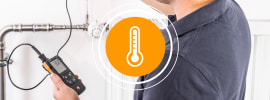Practical guide: Indoor air quality and comfort level in the workplace
Several hundred million people all over the world work in offices. Many of them are dissatisfied with the ambient conditions where they work. The most common reason for this is complaints about thermal comfort, which are often also related to the indoor air quality.
The complaints usually need to be investigated by a measuring technology technician. This person is faced with the challenge of objectively evaluating employees' thermal sensations in order to determine whether the complaints are justified and, where applicable, pinpoint their causes and eliminate them.
From a business perspective alone, it goes without saying that the complaints need to be taken seriously, since employee performance directly relates to the ambient conditions in the workplace.
Added to this is the fact that, regardless of complaints, the indoor air quality also has an impact on employees’ immune systems and certain pathogens have a higher chance of survival if the indoor air is too dry. Employees therefore run a double risk, because they may be exposed to more pathogens if their immune system is weakened.
In this practical guide you will learn ...
... which parameters have an influence on the indoor air quality and how to measure them
... what thermal comfort means and how to evaluate it
... how to proceed as a measuring technology technician in the event of complaints
... how the health of employees can be safeguarded proactively
Would you like to read the full guide?
If so, please register for the download now.


































